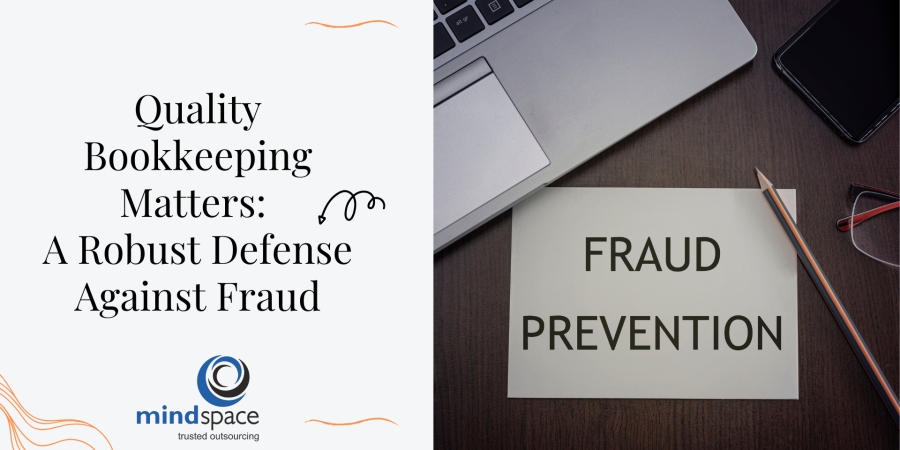Quality Bookkeeping Matters: A Robust Defense Against Fraud
Quality bookkeeping is not just a mundane task of recording financial transactions; it’s a critical shield that organizations wield against the threat of fraud. Through meticulous maintenance of accurate and transparent financial records, businesses fortify their defenses, detect anomalies, and prevent fraudulent activities. In this comprehensive exploration, we delve into the myriad reasons why quality bookkeeping stands as a stalwart guardian against fraud.
Early Detection: A Sentinel on Guard
At the heart of quality bookkeeping lies the practice of vigilant monitoring and regular reconciliation of financial transactions. This diligence serves as an early warning system, capable of identifying even the faintest irregularities or discrepancies. By cross-referencing financial records with tangible evidence such as receipts and bank statements, businesses can swiftly intercept and investigate potentially suspicious transactions. The ability to spot these anomalies in their infancy empowers organizations to take swift corrective actions, thwarting fraudulent activities before they escalate.
Internal Controls: The Gatekeepers of Accuracy
Robust internal controls constitute the backbone of exemplary bookkeeping practices. These controls encompass a web of procedures and checks designed to ensure the accuracy and legitimacy of financial transactions. One cornerstone of internal controls is the segregation of duties, a strategy that mandates the involvement of multiple individuals in critical processes. This division of labor erects formidable barriers against fraud by necessitating collusion for malfeasance. By requiring different team members to participate in various stages of financial operations, organizations introduce complexity that potential wrongdoers find difficult to navigate.
Audit Trail: The Forensic Chronicle
The creation and maintenance of a comprehensive and meticulously documented audit trail are fundamental to effective bookkeeping. This chronological account of financial events provides a trail of breadcrumbs that investigators can follow to reconstruct the sequence of transactions. From initiation to completion, every step is documented, including key details like the initiator’s identity, timing, and supporting documentation. In the context of fraud prevention, this trail not only acts as a record but also serves as invaluable evidence in identifying and rectifying fraudulent activities.
Reconciliation: Balancing the Ledger and the Scales of Justice
The process of reconciling financial statements with supporting records—such as bank statements—is a potent weapon in the arsenal of quality bookkeeping. Through meticulous comparison, any deviations, inconsistencies, or unauthorized transactions are brought to light. These telltale signs could be indicative of fraud and provide a starting point for deeper investigation. By scrutinizing balances and dissecting any discrepancies, organizations uncover hidden schemes and prevent potential financial losses.
Data Analysis: Uncovering the Patterns of Deception
An essential facet of quality bookkeeping is data analysis—a method that transcends mere recordkeeping and embraces the role of a detective. By scrutinizing financial data, trends, patterns, and anomalies emerge. With the aid of advanced data analysis tools, businesses can uncover unusual transactions or behavioral patterns that may indicate fraudulent activities. This proactive approach, bolstered by technology and analytics, empowers organizations to detect potential fraud before it inflicts damage.
External Audits: The Third-Eye Perspective
Regular external audits, conducted by impartial and independent accounting firms, offer an additional layer of security. These audits scrutinize financial statements, assess internal controls, and provide objective recommendations for improvements. The fresh perspective external auditors bring to the table can often unearth fraud that internal measures might overlook. By subjecting financial practices to external scrutiny, organizations establish transparency and enhance their fraud resistance.
Ethical Environment: Cultivating a Culture of Integrity
Exemplary bookkeeping practices foster an ethical climate within organizations. Establishing a culture of integrity and ethical conduct encourages employees to report suspected fraud or misconduct. When individuals feel empowered to raise concerns without fear of reprisal, the likelihood of uncovering fraudulent activities increases significantly. Encouraging open communication and instituting whistleblower protection mechanisms further solidify the ethical fabric of the organization.
A Holistic Approach to Prevention
While quality bookkeeping is undeniably pivotal, it must synergize with a suite of preventive measures. Employee training in fraud awareness equips staff with the knowledge and vigilance to recognize red flags. Periodic risk assessments identify vulnerabilities, enabling organizations to shore up weak points. Robust cybersecurity measures safeguard against the rising tide of digital fraud, fortifying the organization’s digital assets.
In summation, quality bookkeeping serves as a sentinel against fraud, wielding early detection, internal controls, audit trails, reconciliation, data analysis, external audits, and an ethical environment as its formidable tools. By weaving these elements into the organizational fabric, businesses construct an intricate tapestry of defense, impervious to the subtle machinations of fraudsters. As threats evolve, so must these defenses, ensuring that organizations remain one step ahead in the ongoing battle against fraud.


